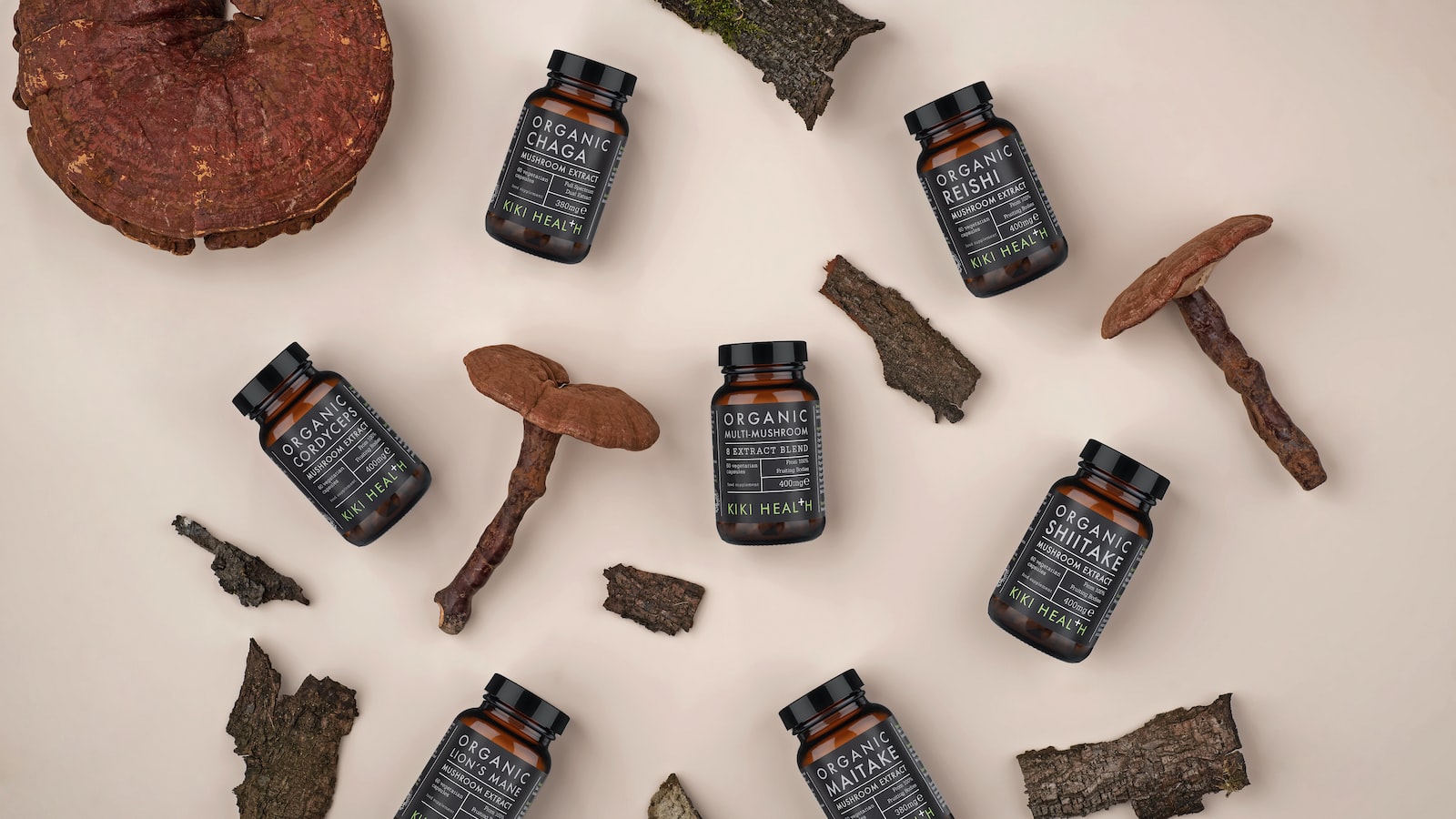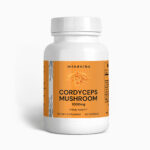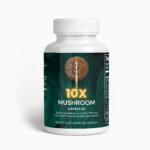
“Chaga vs Lion’s Mane vs Ashwagandha: Uncovering Unique Health Benefits”
If you’re someone who is committed to your health and wellness journey, chances are you’ve come across a variety of natural supplements that claim to offer a wide range of health benefits. However, with so many options available, it can be difficult to determine which ones are truly worth your time and money. In this article, we’ll be taking a closer look at three popular supplements: Chaga, Lion’s Mane, and Ashwagandha. By examining the unique health benefits of each supplement, we’ll help you make an informed decision about which one might be best suited to your needs. So, whether you’re looking to boost your immune system, improve your cognitive function, or reduce stress and anxiety, we’ve got you covered. Let’s dive in and uncover the impressive health benefits of Chaga, Lion’s Mane, and Ashwagandha.
1. Chaga: Nature’s Immunity Booster
Chaga mushroom, scientifically known as Inonotus obliquus, grows on the birch trees found in colder regions. The power-packed mushroom has been used in traditional medicine for centuries, thanks to its incredible immune-boosting properties. Here are a few ways Chaga mushroom can help you boost your immunity:
- Antioxidant properties: Chaga mushroom is loaded with antioxidants, which battle free radicals that cause cell damage and inflammation. Antioxidants help prevent various health issues, such as cancer, heart disease, and diabetes.
- Anti-inflammatory effects: One of the most significant benefits of Chaga mushroom is its anti-inflammatory properties. Chronic inflammation is the root cause of most diseases, and Chaga can help prevent diseases related to inflammation, such as arthritis and allergies.
- Immune-boosting effects: Chaga mushrooms have immune-stimulating effects, meaning they can help your body’s immune system fight off infections and diseases. Chaga helps increase the production of immune cells, such as white blood cells.
Adding a cup of Chaga tea to your daily routine is an easy and natural way to boost immunity. You can also find Chaga mushroom supplements and add them to your daily routine. But as always, consult a doctor before adding any new supplements to your routine, especially if you are on medications or have underlying medical conditions.
In summary, Chaga mushroom is a natural immunity-boosting food that’s rich in antioxidants, anti-inflammatory compounds, and has immune-stimulating effects. Adding Chaga to your diet can help boost immunity and keep your health in tip-top shape. So, why not give Chaga mushroom a try? Your immune system will undoubtedly thank you for it!
2. Lion’s Mane: The Brain’s Best Friend
Lion’s Mane mushroom is revered in traditional Chinese medicine for its brain boosting properties. Now, researchers are beginning to uncover the truth behind the mushroom’s brain-boosting abilities. Lion’s Mane contains compounds that support the health of neurons and may even stimulate the growth of new ones.
One of the main active ingredients in Lion’s Mane is hericenones. These compounds are known to boost the production of Nerve Growth Factor (NGF), a protein that plays a crucial role in the growth and survival of neurons. By supporting the health of neurons, Lion’s Mane may help improve cognitive function and even protect against age-related cognitive decline.
In addition to improving cognitive function, Lion’s Mane may also have mood-boosting effects. By supporting the health of neurons in the prefrontal cortex, the part of the brain responsible for mood regulation, Lion’s Mane may help alleviate symptoms of anxiety and depression. So if you’re looking for a natural way to improve cognitive function and boost your mood, Lion’s Mane may be just what you need.
3. Ashwagandha: The Stress Terminator
Ashwagandha is a superfood that has been used for centuries in Ayurvedic medicine for its stress-relieving properties. This ancient herb is known for its ability to reduce cortisol levels in the body, which is the hormone responsible for stress. Ashwagandha is an adaptogen, which means it helps the body cope with physical and mental stress.
Studies have shown that Ashwagandha can improve cognitive function and reduce anxiety and depression. Ashwagandha contains compounds called withanolides, which have been shown to increase brain function and improve cognitive abilities. It can also help reduce anxiety and depression by lowering cortisol levels and increasing serotonin levels in the body.
If you’re looking for a natural way to relieve stress, Ashwagandha could be the perfect solution. It’s easy to incorporate into your diet by taking it in capsule, powder, or liquid form. You can also add it to your daily routine by drinking Ashwagandha tea. Incorporating Ashwagandha into your daily routine can help relieve stress, improve cognitive function, and promote overall well-being. So why not give it a try?
4. Chaga vs Lion’s Mane: The Battle for Better Health
When it comes to boosting health and wellness, both chaga and lion’s mane mushrooms are highly regarded for their potential benefits. They both contain powerful antioxidants, anti-inflammatory properties, and are packed with vitamins and minerals. But how do you know which one to choose? Here, we’ll explore the differences between the two and make a case for why chaga may be the superior choice.
Chaga
- Known as the “King of mushrooms,” chaga has been used for centuries in traditional medicine for its healing properties.
- It’s rich in polysaccharides, which are believed to enhance immune system function and reduce inflammation in the body.
- Chaga also contains betulinic acid, which has been shown to have anti-cancer properties.
Lion’s Mane
- Lion’s mane contains compounds called hericenones and erinacines, which are believed to stimulate nerve growth factor (NGF) production in the brain, potentially leading to improved cognitive function.
- It’s also been shown to have anti-inflammatory effects and may help reduce symptoms of anxiety and depression.
- However, some studies have suggested that lion’s mane may not be as effective as chaga in boosting the immune system.
Ultimately, the choice between chaga and lion’s mane comes down to personal preference and health goals. However, if you’re looking for a powerful immune-boosting mushroom with anti-cancer properties, chaga may be the better choice. Its long-standing use in traditional medicine and wealth of scientific research support its potential benefits for overall health and wellness.

5. Ashwagandha vs Chaga: Understanding the Differences
Ashwagandha and Chaga are two highly popular herbal supplements in the health and wellness community, with both being touted for their potential health benefits. While there are similarities between the two, there are also significant differences that are worth considering before deciding which one to try. In this post section, we’ll dive into the key differences between Ashwagandha and Chaga, so you can make an informed decision.
One of the main differences between Ashwagandha and Chaga is their origin. Ashwagandha is a herb that has its roots in Ayurvedic medicine, while Chaga is a type of mushroom that has been used in traditional Siberian medicine. Although both have been used for centuries to treat various health issues, they have different nutrient profiles. Ashwagandha is known for its high levels of withanolides, compounds that have been shown to reduce stress and anxiety, improve brain function, and have anti-inflammatory effects. Chaga, on the other hand, is a rich source of antioxidants, specifically betulinic acid and ergothioneine, which have been linked to improved immune function, reduced inflammation, and anticancer effects.
Another distinction between Ashwagandha and Chaga is the forms in which they are available. Ashwagandha is commonly sold in powder or capsule form, which can be added to smoothies or taken as a supplement. Chaga, on the other hand, is typically sold in the form of tea, tincture, or supplement capsules. Both supplements are widely available, and it’s important to choose a reputable product from a trustworthy source.
Ultimately, whether you choose to take Ashwagandha or Chaga, both supplements offer potential health benefits and can be valuable additions to a healthy lifestyle. However, it’s important to note that herbal supplements are not a replacement for medical advice and should be taken under the guidance of a healthcare professional. Regardless of which supplement you choose, make sure to source it from a trustworthy provider, and practice consistency in consumption in appropriate doses to reap the full potential benefits.
6. Lion’s Mane vs Ashwagandha: Which is Right for You?
If you’re looking for a natural supplement to improve your cognitive function and overall health, you may be considering Lion’s Mane or Ashwagandha. Both are popular options with a range of benefits, but which one is right for you? Let’s take a closer look at each supplement.
Lion’s Mane is a mushroom that has been used in traditional Chinese medicine for centuries. It is known for its ability to support brain function, particularly memory and focus. Additionally, Lion’s Mane has anti-inflammatory properties and may improve digestion and immune function. If you’re looking to boost your cognitive performance or alleviate symptoms of anxiety and depression, Lion’s Mane may be the right choice for you.
Ashwagandha, also known as Indian ginseng, is an adaptogenic herb that is used primarily to combat stress and anxiety. It can also improve sleep quality and increase muscle mass and strength. Ashwagandha is a good choice if you’re looking to reduce the effects of stress on your body and mind. It also has anti-inflammatory properties and may improve insulin sensitivity.
- If you want to improve cognitive function: Lion’s Mane
- If you want to combat stress and anxiety: Ashwagandha
- If you want to boost your immune system: Lion’s Mane
- If you want to improve sleep quality: Ashwagandha
Ultimately, the decision between Lion’s Mane and Ashwagandha will depend on your specific needs and goals. Consult with your healthcare provider before adding any new supplements to your routine. With their guidance, you can determine which supplement is right for you and start experiencing the benefits.
7. Unlocking Unique Health Benefits: The Power of Chaga, Lion’s Mane, and Ashwagandha
It’s no surprise that nature has provided us with a wealth of health benefits and remedies. In recent years, there has been an increasing interest in natural supplements. Chaga, Lion’s Mane, and Ashwagandha are three examples of unique and powerful herbal supplements that have been used for centuries. Here’s what you need to know about these three powerful supplements and the health benefits they offer.
- Chaga: This mushroom is commonly found in cold regions such as Russia, Europe, and Asia. Chaga is a rich source of antioxidants that protect your body against free radicals that can cause cancer and other diseases. Additionally, Chaga is characterized by anti-inflammatory properties that can reduce inflammation and promote heart health.
- Lion’s Mane: This unique mushroom has been used for centuries in traditional Chinese medicine. It has been shown to enhance cognitive function, memory, and concentration. It is also believed to help with anxiety and depression. Lion’s Mane has anti-inflammatory properties that can reduce the risk of chronic diseases such as heart disease and diabetes.
- Ashwagandha: This is an herb used in Ayurvedic medicine. Ashwagandha has been used to treat anxiety, stress, insomnia, and depression. It also has anti-inflammatory properties that can help prevent chronic diseases such as cancer, heart disease, and diabetes. Ashwagandha can also help boost the immune system and improve overall physical and mental health.
If you’re looking for a natural way to improve your overall health, all three of these supplements are worth considering. However, it’s important to note that herbal supplements aren’t a substitute for traditional medicine. Be sure to speak with your doctor before adding any supplements to your health routine. While these supplements may offer an array of health benefits, they may not be suitable for everyone.
As you can see, each of these fungi offer unique health benefits that can help you look and feel your best. Whether it’s chaga for anti-inflammation, lion’s mane for brain health, or ashwagandha for mental and physical endurance, there is something out there for everyone. So, why not boost your health and add some of these incredible fungi to your daily routine today? With such a wide array of health benefits, you are destined for success!

























